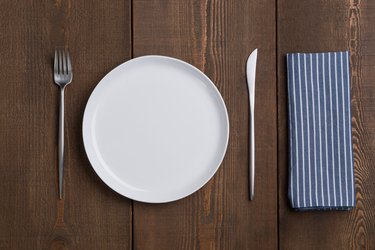
During the first few hours of a fast, your body gets its fuel from glycogen stores in your liver and muscles; the glycogen is broken down into glucose. Once the glycogen is gone, however, your body breaks down a mix of both fat and muscle to provide it with the fuel it needs. The amount of muscle lost will depend on the type of fast, and on the amount and type of activity you participate in during the fast.
Tip
When you're fasting, your body may use a combination of fat and muscle for fuel. However, your body may prefer one source of energy over another based on your activities and type of fasting.
Video of the Day
Muscle and Fat Fuel Fasting
Your body stores some extra fuel in your muscles and liver in the form of glycogen, which is enough to sustain your body for the first few hours of a fast. Although protein won't become the main fuel for your body, you will start using protein for at least some of your energy needs as soon as your glycogen stores are gone.
Video of the Day
Your body needs to break down both fat and muscle to get all the necessary components to form the glucose your brain uses for fuel, as the main components of body fat, called fatty acids, can't be turned into glucose.
Read more: 13 DOs and DON'TS of Intermittent Fasting
Fasting and Body Composition
Both alternate-day fasting and whole-day fasting help reduce your weight and your body fat, according to a review article published in Nutrition Reviews in 2015. Not all of the weight you lose with these types of fasting comes from fat, however. In a study published in The American Journal of Clinical Nutrition in 2005, people who tried alternate-day fasting for 21 days lost about 2.5 percent of their body weight, some of it from muscle and some from fat.
Exercising to Limit Muscle Loss
Intermittent fasting involves not eating for a certain number of hours during the day or only fasting on alternate days, rather than not eating for the entire period of the fast.
A study published in the Journal of the International Society of Sports Nutrition in 2014 found that only eating within an eight-hour window during the day and fasting the other 16 hours — plus doing four resistance training workouts per week — led to improvements in body composition, but that this type of intermittent fasting or resistance training alone didn't significantly help improve body composition. The resistance training helped people retain muscle while losing weight due to the intermittent fasting.
It may also be possible to increase fat loss and minimize muscle loss by doing moderate intensity cardio workouts three to five days per week during 12- to 14-hour mini-fasts and following a diet low in fat and low on the glycemic index, according to another study published in Medical Hypotheses in 2009.
Intermittent Fasting vs. Reduced Calories
Following a reduced-calorie diet and intermittent fasting are equally effective for losing weight, according to a study published in the International Journal of Obesity in 2011, but intermittent fasting was slightly better for reducing insulin resistance. Both groups experienced similar losses in body fat and muscle, so intermittent fasting doesn't appear to be better for maintaining muscle while losing weight.
Another study, published in Menopause in 2012, found similar results with regard to changes in body composition and weight loss between being on a continuous-restrictive diet or an intermittent-restrictive diet. On a reduced-calorie diet, about 25 percent of weight loss usually comes from muscle, unless you participate in resistance training to help maintain your muscle.
Read more: How Intermittent Fasting Can Get You Lean
Considering Your Calories
Fasting can also slow down your metabolism if you eat too few calories, increasing the risk of regaining any lost weight once you go back to eating normally. This regained weight would most likely be in the form of fat, so that your body fat percentage could actually end up higher than before you went on a diet.
Diets providing less than 1,200 calories per day aren't recommended for women, and men should eat at least 1,800 calories per day to avoid having nutrient deficiencies and slowing down their metabolism.
- The American Journal of Clinical Nutrition: Alternate-Day Fasting in Nonobese Subjects: Effects on Body Weight, Body Composition and Energy Metabolism
- International Journal of Obesity: The Effects of Intermittent or Continuous Energy Restriction on Weight Loss and Metabolic Disease Risk Markers: A Randomised Trial in Young Overweight Women
- Menopause: Short- and Long-Term Effects of Continuous Versus Intermittent Restrictive Diet Approaches on Body Composition and the Metabolic Profile in Overweight and Obese Postmenopausal Women: A Pilot Study
- Nutrition Reviews: Effects of Intermittent Fasting on Body Composition and Clinical Health Markers in Humans
- Journal of the International Society of Sports Nutrition: Effects of Intermittent Fasting on Body Composition and Mood State
- Medical Hypotheses: A "Mini-Fast With Exercise" Protocol for Fat Loss
- Biochemistry, 5th Edition: Section 30.3 Food Intake and Starvation Induce Metabolic Changes
- American Council on Exercise: What Are the Guidelines for Percentage of Body Fat Loss?